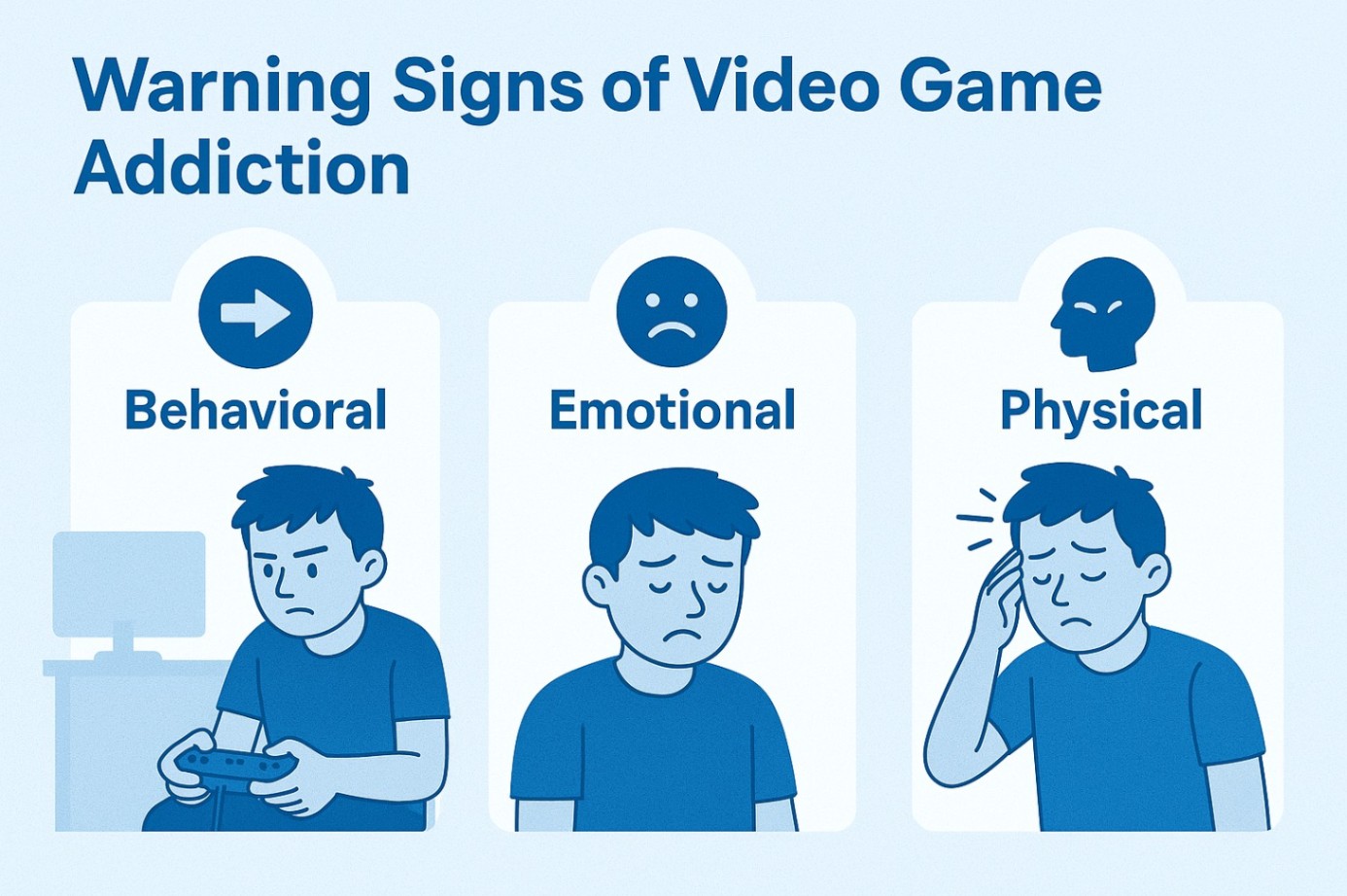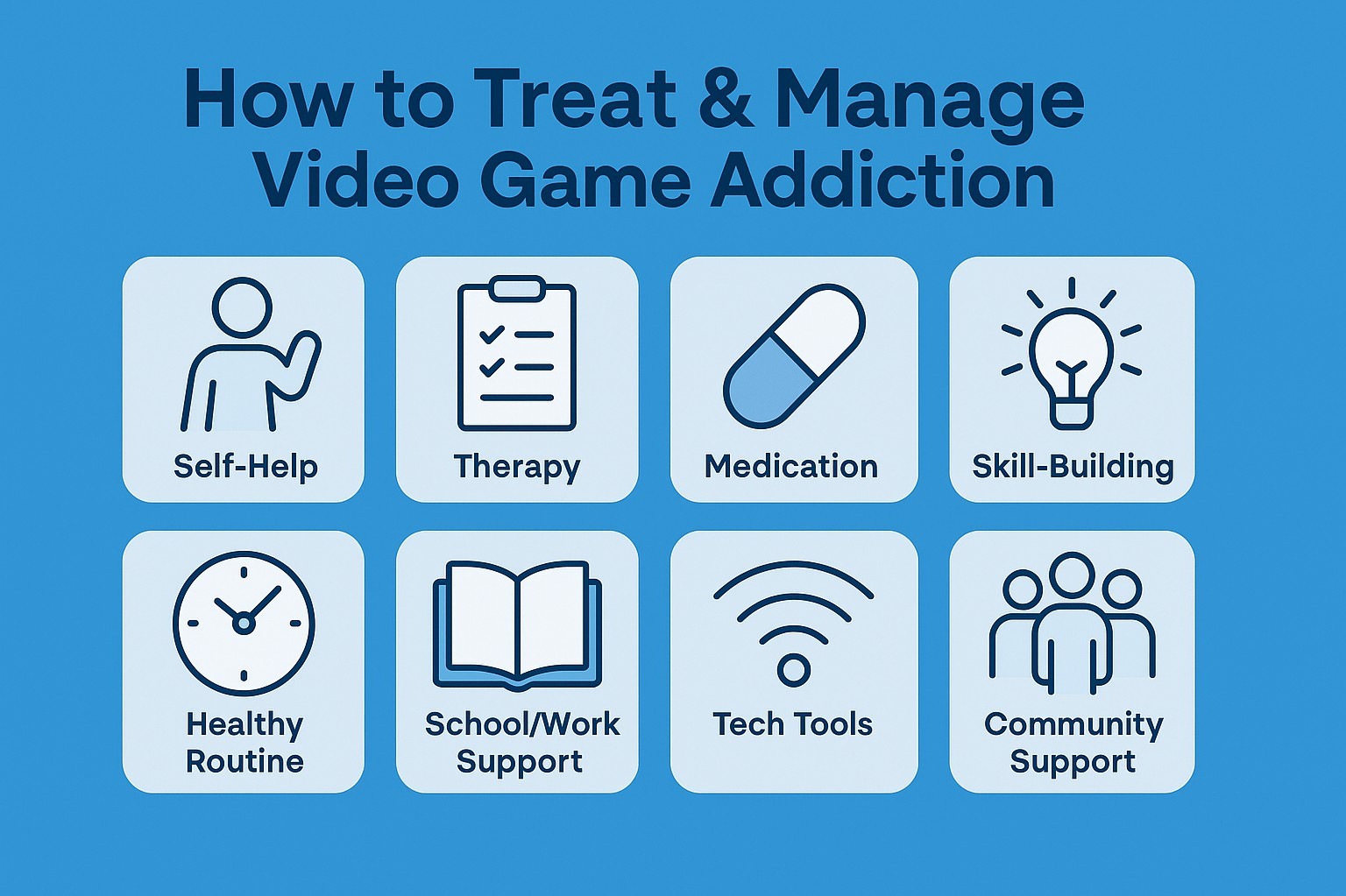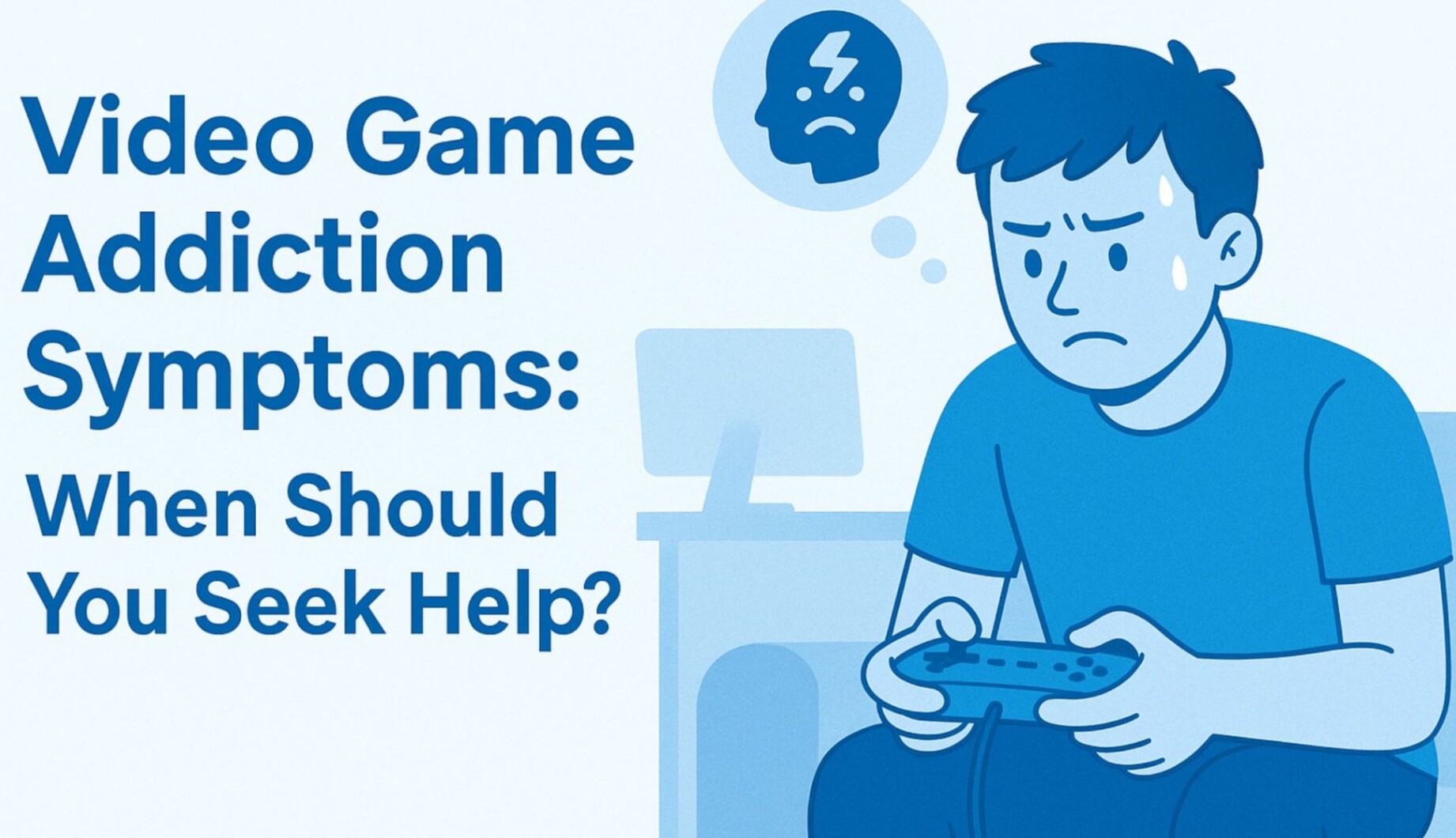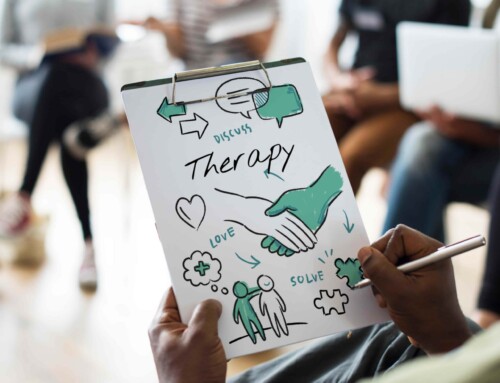Video Game Addiction Symptoms: When Should You Seek Help?
TL;DR
|
|---|
For many, video games are a fun way to relax, connect with friends, and even build new skills. But when gaming starts to take over school, work, or relationships, it can become more than just a hobby.
In fact, the American Psychiatric Association highlights this concern in its DSM-5-TR, where the condition is referred to as Internet Gaming Disorder (IGD). IGD is listed in the section recommending conditions for further research, alongside caffeine use disorder and other emerging concerns.
At Total Life Counseling, we regularly work with individuals and families who are affected by gaming addiction, providing counseling, behavior strategies, and practical tools to help restore balance in daily life.
In this blog, we’ll cover what are the symptoms of video game addiction, how to recognize behavioral, emotional, and physical signs, and when it may be time to seek professional help.
Why Are Video Games Addictive?
Video games hook players through a mix of psychology, design, and social interaction. Here are the main reasons:
- Reward system: Every level cleared, item collected, or achievement unlocked releases dopamine, reinforcing the urge to keep playing.
- Escapism: Games provide a break from stress, responsibilities, or negative emotions, offering a world where players feel more in control.
- Social connection: Online communities, team play, and friendly competition create belonging and make logging off harder.
- Variable rewards: Unpredictable outcomes, like rare item drops or surprise wins, mimic gambling mechanics and keep players engaged.
These elements combine to make games not just fun but also potentially habit-forming when playtime goes unchecked.
Watch this interview to learn what video game addiction looks like and discover practical ways to get help.
What Are The Warning Signs Of Video Game Addiction?

According to the American Academy of Pediatrics, over 90% of children and teenagers in the United States now play video games, and many dedicate a significant portion of their time to gaming. However, when gaming moves beyond entertainment and begins to interfere with daily life, the warning signs of addiction become important to recognize.
Let’s take a closer look at the common signs of video game addiction:
1. Behavioral Signs To Watch For In Gaming Addiction
One of the first indicators of a gaming problem is a noticeable change in behavior. So what behavioral changes are warning signs of video game addiction?
A person may begin spending an increasing amount of time gaming, often at the expense of school, work, or basic daily activities. This can show up as neglected chores, slipping grades, or poor job performance.
Over time, this intense focus on gaming may also lead to social isolation. Someone might pull away from family members and friends, or even lie about the number of hours they spend playing. In some cases, their social life may shift almost entirely to online gaming communities, while real life relationships are left behind.
Not sure what to do next? This masterclass on gaming addiction shows exactly how to spot red flags early and take back control before gaming takes over
2. Emotional & Psychological Red Flags
Gaming addiction isn’t only about time spent in front of a screen. It also takes an emotional toll. For many, games become a way to escape stress, guilt, or sadness. The virtual world can feel like a safe retreat, but over time, it makes real-life challenges harder to face.
As this reliance grows, emotions often shift quickly. A person may seem on edge, irritable, or unusually down when they are kept away from gaming. These changes aren’t simply “bad moods.” They are warning signals that the game is starting to affect emotional stability.
Perhaps the clearest sign is when gaming becomes the main source of joy. Activities that once brought excitement, such as spending time with friends, pursuing hobbies, or enjoying family moments, fade into the background, leaving the game as the only thing that feels rewarding.
3. Physical Signs You Shouldn’t Ignore
Long hours in front of a screen can harm both cognitive skills and overall physical health.
One of the most common issues is disrupted sleep. Many people stay up late gaming, and when they are forced to stop, they may feel restless or unable to relax.
Fatigue, constant headaches, and eye strain are also frequent complaints. In more serious cases, basic self-care takes a back seat, and hygiene, nutrition, and exercise are neglected.
Struggling with these signs? Book a counseling session today.
What Level Of Gaming Addiction Are You Facing?
Gaming affects everyone differently, from light habits to deeper struggles. Here’s a table that breaks down the levels of gaming addiction.
|
Severity Level |
Indicators |
Impact on Life |
|---|---|---|
|
Mild |
A few symptoms are present; gaming time occasionally exceeds limits |
Minor issues such as incomplete homework or chores; occasional conflicts over gaming |
|
Moderate |
Several symptoms appear; gaming often takes priority over other activities |
Declining grades or work performance, neglected friendships, and frequent dishonesty about gaming |
|
Severe |
Five or more symptoms are consistent; gaming dominates daily thoughts and routines |
Higher risk of job loss or academic failure; serious relationship strain; noticeable health problems |
Gaming addiction can range from mild to severe, depending on how much it interferes with daily life. Mild cases may involve small lapses in focus or tension at home, while moderate cases bring clearer issues like declining grades, strained friendships, or poor work performance.
Severe addiction can take over daily life entirely, leaving little room for anything else and creating serious risk factors for long-term mental health.
Professionals often look for patterns lasting at least 12 months to diagnose internet gaming disorder. Spotting where you fall on this spectrum is the first step in deciding whether small changes are enough or if professional support is needed.
Parents who notice these signs can step in early and support their children’s well-being. Learn practical ways to help kids addicted to video games.
How Can You Treat & Manage Video Game Addiction?

Recovering from video game addiction is possible, and the right approach depends on how severe the problem is. Support can range from small lifestyle changes to professional interventions.
Here are the main options to consider:
1. Take Control With Self-Help
For mild cases, small lifestyle changes can go a long way. Setting screen time limits and scheduling digital detox periods help create healthier boundaries with gaming.
Reintroducing hobbies, sports, or social activities provides new outlets for energy and creativity. Support from family members can reinforce these habits by holding the person accountable and encouraging healthier routines.
Need extra support? Talk to a screen addiction counselor.
2. Therapy That Makes A Difference
When gaming causes significant impairment, therapy often becomes the most effective option. Cognitive behavioral therapy (CBT) teaches individuals how to identify triggers, challenge negative thoughts, and develop healthier coping skills.
Family therapy helps repair communication breakdowns and rebuild trust between loved ones. Group therapy offers peer support and encouragement from others facing the same struggle, reducing the sense of isolation.
3. Medication For Underlying Issues
There is currently no direct medication for gaming disorder, but treatment may be prescribed for mental health conditions that often occur alongside it, such as anxiety, depression, or ADHD.
By treating these underlying issues, the urge to use gaming as an escape can be reduced. Medication works best when paired with therapy, lifestyle changes, and family or community support, rather than used as a stand-alone solution.
Recommended read: Is ADHD a disability or a different way of thinking?
4. Build Real-Life Skills
Practical skill-building is an important part of recovery. Training in time management, stress management, and social skills equips individuals to handle responsibilities without turning to gaming as a coping mechanism.
These skills not only reduce dependency on gaming but also improve confidence and performance in school, work, and relationships.
5. Reset Your Routine
Recovery is much easier with a strong foundation of healthy habits. Prioritizing good sleep, balanced meals, and regular exercise improves both physical and mental health. A steady routine helps regulate energy levels and focus, making it easier to maintain boundaries with gaming and stay engaged in real-world activities.
6. Support At School Or Work
Gaming addiction can affect academic or professional performance, and in these cases, outside support may be needed. Schools can provide academic counseling, tutoring, or modified schedules to help students catch up. Workplaces may offer employee assistance programs or flexible work arrangements. These measures create a more supportive environment for individuals who are trying to balance recovery with daily responsibilities.
7. Let Tech Work For You
The same technology that fuels gaming can also help limit it. Parental controls, time trackers, and screen management apps provide structure and accountability. These tools are particularly helpful for young adults and teens, who may find it harder to self-regulate. When paired with family support, tech tools can be a powerful way to monitor progress and stay on track.
8. Find Strength In Community
Community support can make a big difference in recovery. Peer groups, whether online or in person, provide encouragement, accountability, and a safe space to share experiences. Some follow a 12-step model (for gaming addicts), similar to programs used for substance use disorders and gambling addiction recovery.
In these groups, members work through structured steps such as admitting the problem, identifying the harm caused, making amends, and building healthier habits. This structured approach not only helps individuals take responsibility but also provides long-term guidance and a sense of belonging.
How Total Life Counseling Can Help?
At Total Life Counseling, we know how overwhelming gaming addiction can feel, not just for the person struggling, but also for their family. Our licensed therapists provide compassionate, personalized care to help clients break unhealthy patterns and rebuild balance in daily life.
Our approach includes:
- CBT therapy to replace unhealthy gaming habits with healthier coping strategies
- Family therapy to improve communication and repair relationships
- Group counseling for peer support and encouragement
Total Life Counseling offers a supportive, non-judgmental environment where progress feels achievable. Whether you are a parent worried about your child or a young adult struggling with gaming addiction, our team is here to guide you.
Ready to take the first step? Contact Us today.
Conclusion
Video games can be a great source of fun and connection, but when they start overshadowing school, work, or relationships, it’s a sign to step back. Recognizing the symptoms early is not about giving up gaming altogether, it’s about regaining balance and creating space for healthier routines.
With the right support, what feels overwhelming today can turn into a chance to rebuild confidence, strengthen relationships, and enjoy gaming in moderation without losing sight of real-life priorities.
Frequently Asked Questions
How can I tell if someone is addicted to video games?
You can tell if someone is addicted to video games when gaming starts interfering with daily life. Common signs include neglecting school, work, or chores, lying about gaming hours, irritability or anxiety when not playing, loss of interest in other hobbies, disrupted sleep, and physical issues like fatigue or headaches.
Is video game addiction a real mental health issue?
Yes, video game addiction is considered a real mental health issue. The World Health Organization recognizes it as “gaming disorder,” and the Diagnostic and Statistical Manual of Mental Disorders lists “internet gaming disorder” as a condition requiring further study, confirming its clinical significance.
What is the difference between loving video games and being addicted?
Loving video games is a hobby that you can control and balance with your responsibilities. Video game addiction is a behavioral addiction characterized by a compulsive need to play, leading to negative consequences in your mental health, relationships, and daily life, much like substance use.
What steps should I take if I suspect someone has a gaming addiction?
If you suspect someone has a gaming addiction, the first step is to talk to them about your concerns. Encourage them to seek professional help from a mental health professional who can provide a diagnosis and recommend treatment options. Building a strong support system is also crucial.
Do video games increase ADHD symptoms?
Yes. Too much gaming can intensify difficulties with focus, attention, and impulsivity in people with ADHD. While short play sessions may feel stimulating, overuse often makes ADHD symptoms harder to manage in daily life.
What parents do to withdrawal symptoms video game addiction?
Parents can create consistent screen time rules, offer healthy alternatives like sports or hobbies, and provide emotional support. If withdrawal symptoms such as irritability, anxiety, or sleep problems persist, professional guidance is recommended.
What should I do if I recognize symptoms of video game addiction in a family member?
Start with a calm and supportive conversation, encourage balance in their routine, and seek help from a therapist or counselor experienced in gaming or behavioral addictions.
Are there physical symptoms associated with video game addiction?
Physical symptoms of video game addiction may include eye strain, headaches, disrupted sleep, fatigue, and posture-related issues from extended hours of play.
Filed in: Jim West, Video Game Addiction
Share This Story, Choose Your Platform!
Total Life Counseling Center consists of Licensed Counselors, masters level therapists, Español counselors, Licensed Mental Health Counselors, business coaches, and image enhancement coaches who provide counseling for emotional, mental, physical and spiritual care including marriage, individual, family, substance abuse and more. TLC’s family, trauma and marriage experts have been interviewed on National and Local TV/Radio over 200 times for their expert advice on Fox News, OWN, WETV, ABC’s Medical Minute and more. Our skilled counselors are relational, approachable and specialists providing therapy services in the Central Florida area including: Orlando, Winter Park, MetroWest, Windermere, Dr. Phillips, East Orlando, Lake Mary, and Clermont, Boca Raton Florida, and Dallas, TX.






